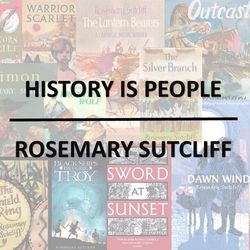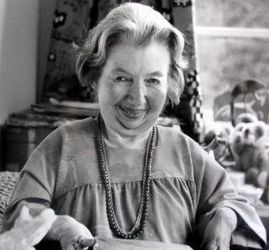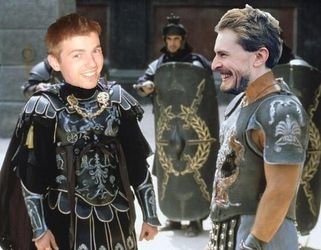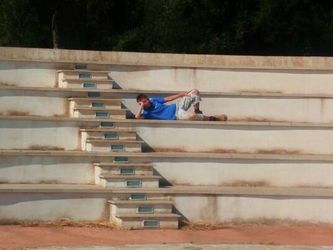Latest episode

2. 2: Rosemary Sutcliff: History is People
25:45||Season 2, Ep. 2In this essay, 'History is People' acclaimed historical novelist Rosemary discussed her responsibilities as a children's author and her belief that human nature remains essentially consistent and relatable throughout history, using a range of texts from the Homeric Age to the English Civil War to illustrate her points. The essay was originally distributed at a conference for the Children's Literature in Education journal in Exeter in 1971, and was later reprinted in the 1973 anthology Children and Literature: Views and Reviews, edited by Virginia Haviland, which is where this reading is taken from. The text can be found here: https://archive.org/details/childrenliteratu00havi Voice Cast: Alex Davis as Rosemary Sutcliff Nikos Karydis as Homer Flavio Bacci as the Roman soldier Sarah Bremner as Margret Paston Vicky Saward Read as Catherine Parr And Jay Ingate as Edward Spencer Music Credits: Meditation Impromptu One to Three, Touching Memories, Relaxing Piano Music and Crossing the Divide, all by Kevin Macleod and available from incompetech.com If you’d like to find out more about Rosemary Sutcliff, you can visit the official website at RosemarySutcliff.net You can also read David's analyses of various Sutcliff novels and short stories on website for the Our Mythical Childhood Survey, an international project which looks at the influence of Classical culture on modern children’s media: http://www.omc.obta.al.uw.edu.pl/myth-survey/search
More episodes
View all episodes

1. 1: Rosemary Sutcliff and Re-imagining Roman Britain (Documentary)
01:23:56||Season 2, Ep. 1With millions of copies sold in a variety of languages, as well as various literary awards and a CBE to her name, Rosemary Sutcliff was one of the most successful 20th century authors of historical fiction. Many of her works follow the adventures of a family across the generations, from Roman to Post-Roman Britain, beginning with Marcus in her most famous novel The Eagle of the Ninth. Alongside this series – known as the Dolphin Ring Saga – she also published several others novels set in Roman Britain, including Outcast, Mark of the Horse Lord, Song for a Dark Queen and The Capricorn Bracelet. Sutcliff was able to conjure an evocative picture of life in Roman Britain, not only regarding her characters and the material culture they interact with, but also the natural world that they inhabit. Although she passed away in 1992, Sutcliff’s impact continues to be felt to this day, with various archaeologists and historians having been inspired to pick up their trowels and pens by Sutcliff. How Sutcliff came to imagine Roman Britain had much to do with her experiences in childhood and adolescence. She did not have an easy time growing up, with her father often away on naval duty for long periods at a time and her mother frequently experiencing depressive episodes. Moreover, she was diagnosed with Still’s Disease at a young age, which severely affected her mobility for the rest of her life, and her illness coupled with her family’s frequent moves meant her childhood was often lonely. However, one way in which Sutcliff was able to escape these issues was reading vast amounts of literature, with Rudyard Kipling her favourite author. Before becoming an author, she also found success as a painter, with her work displayed at the Royal Academy. As the 14th December 2020 marks what would have been Sutcliff’s 100th birthday, we’ve put together an audio documentary about her life and works, exploring how she engaged with themes such as religion, nature, nationality, sexuality, material culture and disability Roman Britain, as well as her continuing impact today. You can find out more about Rosemary Sutcliff at https://rosemarysutcliff.net/ Contributors to this documentary include:Anthony Lawton (Sutcliff’s Godson and Chair of Sussex Dolphin)Kate Gilliver (Cardiff University)Donald Gordon (The Trimontium Trust)Tony Keen (University of Notre Dame)Deborah Roberts (Haverford College) Giacomo Savani (Trinity College Dublin) Ellen Swift (University of Kent)Voice-overs were provided by:Alex Davis (Rosemary Sutcliff)Lee Grana (Agricola)Andy Bates (Uncle Aquila)Phil Hughes (Esca)Jay Ingate (Alexios) The music featured in this production includes: • Peace of Mind • Winds of the Rain Forest • Garden Music • Easy Lemon • White Lotus • Sad Trio • Relaxing Piano Music • Music for Manatees All by Kevin Macleod Along with ‘Time to Run Finale' by Dexter Britain
51. 51: Goes to the Movies: 20 Years of Gladiator
01:16:26||Season 1, Ep. 51Ridley Scott's Gladiator premiered on the 1st May 2000, and to mark the 20th anniversary David and Jay look back on the box-office smash, multi-award winner and cultural phenomenon. They discuss The Fall of the Roman Empire (1964), on which Gladiator was based, recreating Rome for the 21st century, whether was Commodus really that bad, what connects Maximus to George Bush Jr, the inspiration by Hans Zimmer's score, and if Hollywood is ready to make a film with an African emperor...
50. 50: Antony Lee (Durham University)
01:01:40||Season 1, Ep. 50Antony joins David to discuss his PhD 'Gods Behind Glass', which looks at the interpretation of Romano-British religious practice and identity in museums. They discuss changing views of religion in Roman Britain, including shifts from interpreting it as accommodation to domination, the sensory experience of ritual, where people's perceptions of the Roman religion originate from, and Mithras (obviously). Antony also talks about his time as curator of the archaeological collections of Lincolnshire County Council, making the jump from this to the PhD, how he's learnt a lot about the Chinese Bronze Age, and Edinburgh at New Years. You can fill out a survey to help with Antony's research at: durham.onlinesurveys.ac.uk/godsbehindglass You can find him on Twitter here and more about his research here.
49. 49: David Walsh (feat. Christopher Burden-Strevens and Matthijs Wibier)
01:21:12||Season 1, Ep. 49Former guests Matthijs Wibier and Christopher Burden-Strevens, prosecco in hand, return to put David in the hot-seat, where he talks about what he's learned from doing the podcast, why he got into archaeology, the modern reception of Roman Britain, cringing over old Facebook statuses, and why you shouldn't always listen to your lecturers.
48. 48: Richard Reece Part 2 (UCL)
42:47||Season 1, Ep. 48In the second half, Richard discusses his work on Roman coinage and how the desire to keep correcting himself propelled his work forward, his influence on those who have gone on to be prominent scholars in their own right (and why he's happy none of them are 'Reecian' in style), deciding to write a book on the archaeology of the Later Roman Empire, and his thoughts on the current state of archaeology.
47. 47: Richard Reece Part 1 (UCL)
48:10||Season 1, Ep. 47Richard joins David for a two-part episode, reflecting on how the study of Roman Britain has evolved since he published 'My Roman Britain', his unique writing style, reviewer feedback - both to him and from him, and how his own approach to material nearly saw him axed from teaching Roman Britain at UCL. He also discusses how he came to lecture in archaeology, starting as a schoolboy digging in Cirencester, to studying biochemistry at university and working as a school-teacher for a while, his subsequent journey around Europe collecting data on Roman coins, and the unexpected turn of events that helped him to fund a PhD. Along the way, he recalls meeting the who's-who of Roman studies: Ian Richmond, Mortimer Wheeler, Molly Cotton, Shepperd Frere ...and Chitty Chitty Bang Bang. You can download My Roman Britain from Richard's academia.edu page here, as well as many of Richard's other publications.
